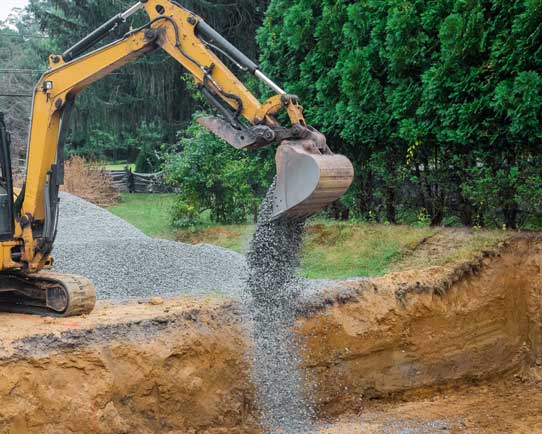Excavation: Get a free quote • Fast response
Excavation
Do you need help with an excavation project? Whether it’s digging a plot of land, water and drainage, drainage or other groundwork, it can be challenging to know where to start. Here we give you an overview of different types of excavation work, what they cost and what you should consider before getting started.
We can also provide you with a free, no-obligation quote from a qualified excavation contractor in your area.
Get a free quote for excavation
Send us a short description of your wishes and needs, and we’ll help you find the best suited excavation contractor for your particular job.
Your contact information will only be used in connection with the request. Your personal data will not be disclosed to unauthorized persons.
Some typical excavation jobs:
There are many different types of excavation jobs that can be relevant for private individuals and businesses. These are some typical excavation assignments:
- Excavation of land prior to the construction of a home, cabin or commercial building. This often involves excavating the building pit, leveling the site and preparing for foundations.
- Excavation for water and wastewater pipes. In the case of new construction or renovation of older facilities, it may be necessary to dig trenches to lay new pipes and cables.
- Drainage around homes or on land. To avoid moisture damage and ensure good drainage of stormwater, trenches are dug around the house and drainage pipes are laid.
- Digging for cables and pipes. When laying electricity, fiber or other types of cables, excavation work may be necessary.
- Building retaining walls, fences or other structures in the garden that require excavation and groundwork before installation.

How much does excavation cost?
The price of excavation depends on the type of material, size of the area, accessibility and complexity. As a rule of thumb, excavation costs are often between NOK 1,500-3,000 per square meter, but this can vary significantly from project to project.
An important factor is the type of material to be excavated. Loose materials such as sand, gravel and clay are relatively easy to excavate and command a lower price. Hard materials such as rock, stone and concrete are more demanding and will result in a higher price per square meter.
Of course, the size of the excavation area also has a lot to say. Larger projects cost more overall but will often result in a lower price per square meter compared to smaller projects. A lot of movement, difficult access or the need for special adaptations can increase the price even on large projects.
Rigging costs, transportation of equipment and materials, as well as disposal of surplus material will also affect the total cost of the excavation job.
How much does it cost to excavate a site?
As an example, excavating a plot of 150 m2 with a depth of 2 meters, at an average price of NOK 2,000 per square meter, will result in a total cost of approximately NOK 600,000 for the excavation work, before any extras.
What does it cost to dig for water and drainage?
The cost of digging for water and drainage for a detached house is typically between NOK 100,000-300,000 depending on pipe types, trench length and ground conditions. In addition, there are connection fees to the municipality.
What drives the price of excavation?
-
Mass type
loose masses are cheaper to excavate than hard masses such as rock and stone. -
Size
large scale often results in a better price per square meter than small projects. -
Complexity
the need for customization or difficult conditions increases the price. -
Accessibility
confined spaces and difficult access mean more time-consuming work. -
Transportation distance
for machinery, equipment and removal of materials. -
Landfill and taxes
costs for delivery and processing of excavated material. -
Season
high season often results in higher prices than low season. -
Experience and reputation
excavation companies with references and a good reputation usually cost more to hire than a start-up excavation company.
Who is responsible for excavation?
For excavation work requiring an application in connection with a building application, an approved contractor with the right of responsibility for excavation and groundwork must be used. This applies, for example, to the excavation of a building pit when constructing a home, or the excavation of water and sewage pipes for new buildings.
For private excavation work that is not part of a building application, there is less regulation. It is the developer’s responsibility to assess the competence of the person carrying out the excavation work, obtain the necessary permits from the municipality/landowner, and ensure that safety is maintained throughout the building application process.
Special rules apply to excavation work near roads. Anyone digging in a public road or less than 3 meters from the edge must have special permission from the authorities, regardless of whether an application is required or not.
All excavation work is subject to strict requirements in the building regulations in terms of safety, stability and environmental conditions. Therefore, always use an experienced and certified professional for excavation work.

The benefits of using professionals for excavation
- The right equipment, such as excavators, trucks and compaction machines, leads to efficient progress and good quality work.
- Experienced professionals have the expertise to assess ground conditions, calculate quantities and carry out the work safely. They can also coordinate with other trades such as concrete, piping and electrical.
- Responsibility and control of permits from the municipality and landowners are taken care of by professional contractors as part of the assignment.
- Warranties and the right to complain ensure that you have someone to turn to in the event of problems or damage in the future. You also don’t have to worry about safety during the work.
- Better end results with a leveled site, compacted soil and the right slope for drainage and pipe trenches. This can save you from problems with subsidence damage, water accumulation or sewer backups.
- Total responsibility for excavation makes the building process easier for you as a developer. You only need to deal with one contracting party and don’t have to spend time managing multiple subcontractors.
Hiring professional excavation contractors is expensive, but the increased quality and peace of mind often outweighs the price difference. It is therefore strongly recommended to use professionals for excavation work.
Does excavation require an application?
Not all excavation work requires an application, but in many cases a permit is required from the municipality before you start. The application requirement depends on the purpose and scope of the excavation.
The following excavation work usually requires an application:
- Excavation of building pits for the construction or significant alteration of buildings.
- Excavation of a trench for new water and wastewater pipes to a home/holiday home.
- Changes in terrain that result in significant changes in elevation on the property.
- Excavation close to a neighbor’s boundary with a risk of damage or inconvenience to the neighbor.
The following can often be carried out without the need for an application:
- Digging drainage ditches around existing buildings.
- Burying small pipes for irrigation, electricity or lighting in the garden.
- Digging in connection with the laying of shingles, paving stones or casting of smaller surfaces.
- Digging on your own property that does not significantly affect the terrain or neighbors.
In any case, you should contact the municipality to clarify whether the measure requires an application before you start. A digging permit is always required for digging in or near public roads. Also check that there are no cables, pipes or cultural monuments in the area before digging.
Is it allowed to dig on your own plot?
As a landowner, you are generally allowed to dig on your own property, as long as the work does not require an application or approval under other laws and regulations. But there are several considerations to consider:
- Check the area for buried cables, pipes and installations before digging.
- Avoid digging closer than 4 meters from the neighboring boundary. Excavation work must not pose a risk of damage to the neighboring property.
- Be wary of deep trenches and slopes that could cause landslides or damage to the surroundings. Professional assessments may be required.
- Changes to the terrain must not result in increased stormwater runoff to the surroundings or disrupt natural drainage routes.
- If you are planning extensive excavation work, always check with the municipality first to see if permission is required or if there are any special considerations that need to be considered.
Even if you are allowed to dig on your own property, this does not always mean that it is advisable. Extensive excavation work should be carried out by professional contractors who have the skills, equipment and necessary insurance to do the job safely and efficiently.
Receive a quote for excavation
How large is the area to be excavated, to what depth, and what types of materials are involved? Do you need to lay pipes, drainage or anything else at the same time? What permits need to be obtained and what applications need to be submitted? An excavation project is often complicated, and it can be difficult to figure all these things out on your own. Whichever company you get a quote from, you should always check if they have references from similar projects and make sure they have the skills and equipment needed.
It can be difficult to know who to contact, which is where we have our expertise. We work with excavation contractors across the country with extensive experience in all types of excavation work. Fill in the form on our site with some information about the job and we’ll forward your enquiry to a qualified excavation company in your area. The service is free and completely non-binding. The excavation company in question will then contact you directly to discuss the assignment further.






